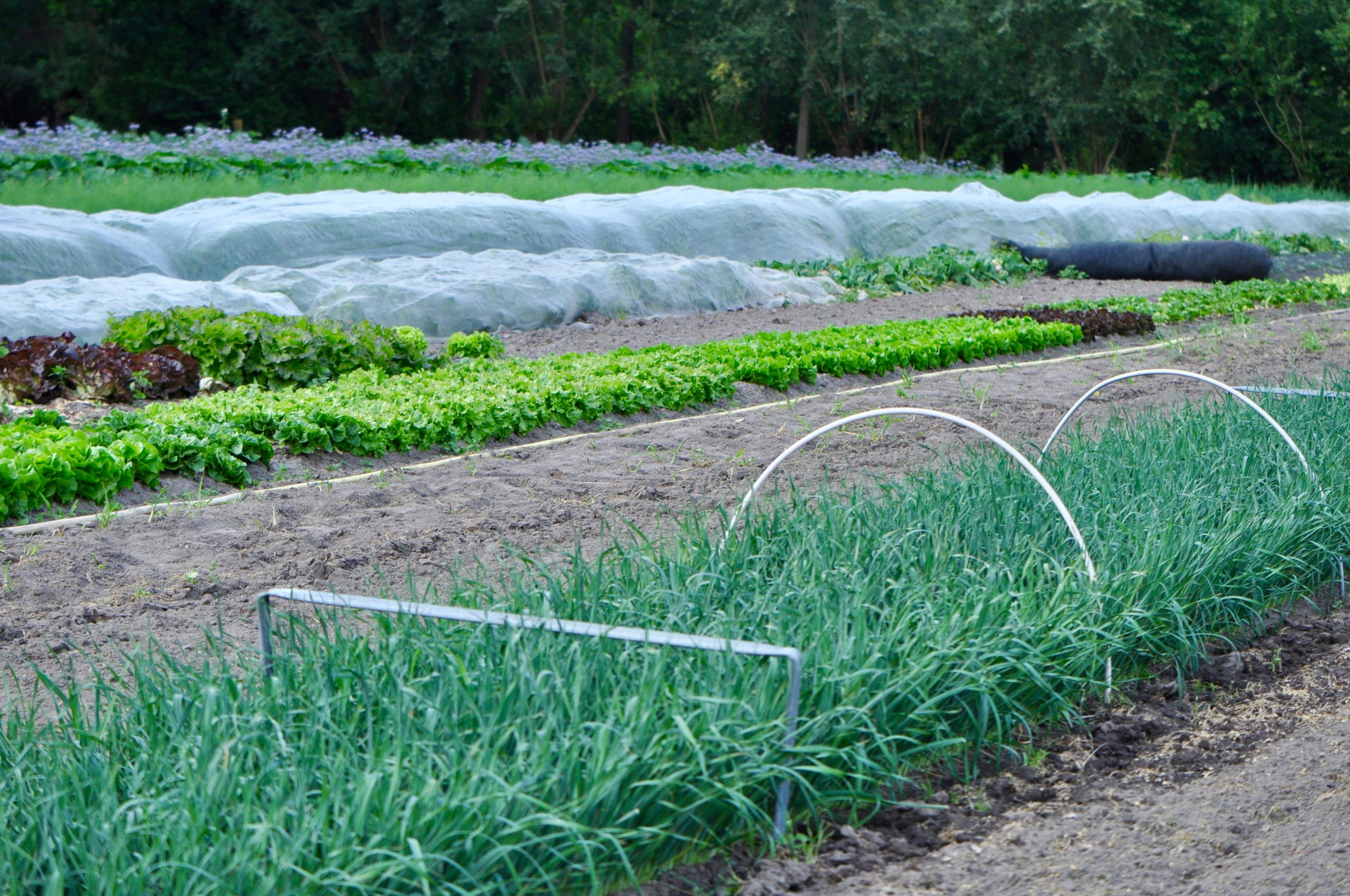
Food policy
Organic 'from Farm to Fork'
European farming practices are influenced by a variety of European policy areas. These include the Common Agriculture Policy; legislation governing the marketing of seed and plant propagating material, water and soil use, the use of GMOs in food, feed and farming, animal health and welfare; as well as consumer related policies, such as food information and labelling. In each of these areas, IFOAM Organics Europe works with like-minded organisations to advocate for a legislative framework promoting environmentally positive farming practices.

With the publication of the European Green Deal in December 2019, the European Commission has launched “a new growth strategy that aims to transform the EU into a fair and prosperous society, with a modern, resource-efficient and competitive economy where there are no net emissions of greenhouse gases in 2050 and where economic growth is decoupled from resource use”. The European Green Deal “also aims to protect, conserve and enhance the EU’s natural capital, and protect the health and well-being of citizens from environment-related risks and impacts”.
The European Green Deal includes two important strategies for the organic sector: The Farm to Fork Strategy and the EU Biodiversity Strategy. On this page you can read more about the role of organic and IFOAM Organic Europe’s advocacy on the Farm to Fork Strategy. To learn more about our activities on biodiversity and the EU Biodiversity strategy, continue reading on our page on biodiversity.
Farm to Fork Strategy
In December 2019, the European Commission unveiled its European Green Deal (EGD). It aims for Europe to become the first carbon-neutral continent and is a “new growth strategy that aims to transform the EU into a fair and prosperous society, with a modern, resource-efficient and competitive economy where there are no net emissions of greenhouse gases in 2050 and where economic growth is decoupled from resource use”. The EGD comprises several strategies, including the Farm to Fork (F2F) Strategy and the EU Biodiversity Strategy, unveiled on 20 May 2020.
According to the F2F communication, the Farm to Fork Strategy is at the heart of the European Green Deal. It “addresses the challenges of sustainable food systems in a comprehensive way, recognising the inextricable links between healthy people, healthy societies and a healthy planet”. The integrated approach of the F2F is mentioned several times.
The strategy consists of a main communication and an annex, serving as an action plan for the F2F strategy. It recognizes that food systems are responsible for approximately 29% of the world’s greenhouse gas (GHG) emissions and that nearly 70% of all agricultural GHG emissions come from the animal sector. It explicitly states that “there is an urgent need to reduce dependency on pesticides and antimicrobials, reduce the use of fertilisers, increase organic farming, improve animal welfare, and reverse biodiversity loss”. The Farm to Fork Strategy intends leading a global transition towards competitive sustainability from farm to fork through achieving these goals:
- Ensuring food production, transport, distribution, marketing, and consumption have a neutral or positive environmental impact;
- Preserving and restoring the land and sea-based resources;
- Mitigating climate change;
- Reversing the loss of biodiversity; and
- Ensuring food security, nutrition, and public health.
To enable this transition, the strategy elaborates that:
- The Commission has devised several research & innovation programmes and other funding mechanisms supporting the objectives of the Green Deal;
- The Commission will therefore promote effective Agricultural Knowledge and Innovation Systems (AKIS); and
- The Commission will ensure tailored solutions help Small and Medium Enterprises (SMEs).
Importantly, one of the Farm to Fork Strategy’s four targets aims to reach 25% of the EU’s agricultural land under organic farming by 2030. The organic sector welcomed that the Commission recognised that organic is part of the solution to more sustainable food systems. IFOAM Organics Europe believes that this target is ambitious but achievable. We elaborate on this in the next section.
IFOAM Organics Europe’s members find a more detailed breakdown of what the Farm to Fork Strategy puts forward on organic, the CAP, fertilisers, pesticides and much more on the IFOAM Organics Europe member extranet. For more information about membership and access to the extranet, contact membership@organicseurope.bio.
Sustainable Food Systems
By the end of 2023, the European Commission aims to reveal its proposal for a legislative framework for sustainable food systems (also called the “SFS law”) as mentioned in the Farm to Fork strategy. This legislation aims at defining what sustainable food systems, as well as sustainable foods, are. In addition, this legislation will include a section on sustainable public procurement and a section on sustainability labelling, with the aim of increasing the demand for and hence the production of sustainable food products.
IFOAM Organics Europe welcomes such legislation, provided it supports a true transition towards more sustainable food systems. Indeed, while we strongly share the Commission’s aim of accelerating and facilitating the transition to more sustainable food systems and ensuring that all foods placed on the EU market become increasingly sustainable, the way this aim will be accomplished in practice is still to be assessed and evaluated.
Please see sections below on sustainable public procurement and sustainability labelling for more information about the specificities of this framework.
IFOAM Organics Europe is also a member of the Food Policy Coalition (FPC), a coalition advocating for a strong proposal for the Sustainable Food Systems Law, highlighting the need to take a food systems approach. We contributed to the elaboration of a policy report providing 4 key recommendations that the SFS law should tackle, to engage a meaningful transition of our food systems.

An important tool to reach the 25% goal and to further develop the organic sector is a comprehensive and well-designed action plan for organic production in the EU, Organic Action Plan (OAP) in short.
On 25 March 2021, the Commission published the 2021-2027 Organic Action Plan, aiming at balancing increases in both production of and demand for organic products. We developed a comprehensive infographic summarising how this new OAP can transform European food and farming through concrete steps to boost organic. IFOAM Organics Europe was delighted to see that many of the points we had advocated for were included in the new OAP. We particularly welcome:
- Minimum mandatory criteria for organic in public procurement;
- Ringfencing of at least 30% of Horizon Europe’s budget to topics relevant to the organic sector; and
- Actions on taxation and the real cost of food.
Furthermore, action 14 of the OAP states “The Commission will (…) encourage Member States to support the development and the implementation of ‘bio-districts’”. Have a look at our page on the CAP & rural development to learn about bio-districts.
Interested readers can have a look at our extensive ten-pager with the European organic movement’s main suggestions for the new OAP prior to its publication, as well as our leaflet with the ten priorities to boost both organic demand and production.
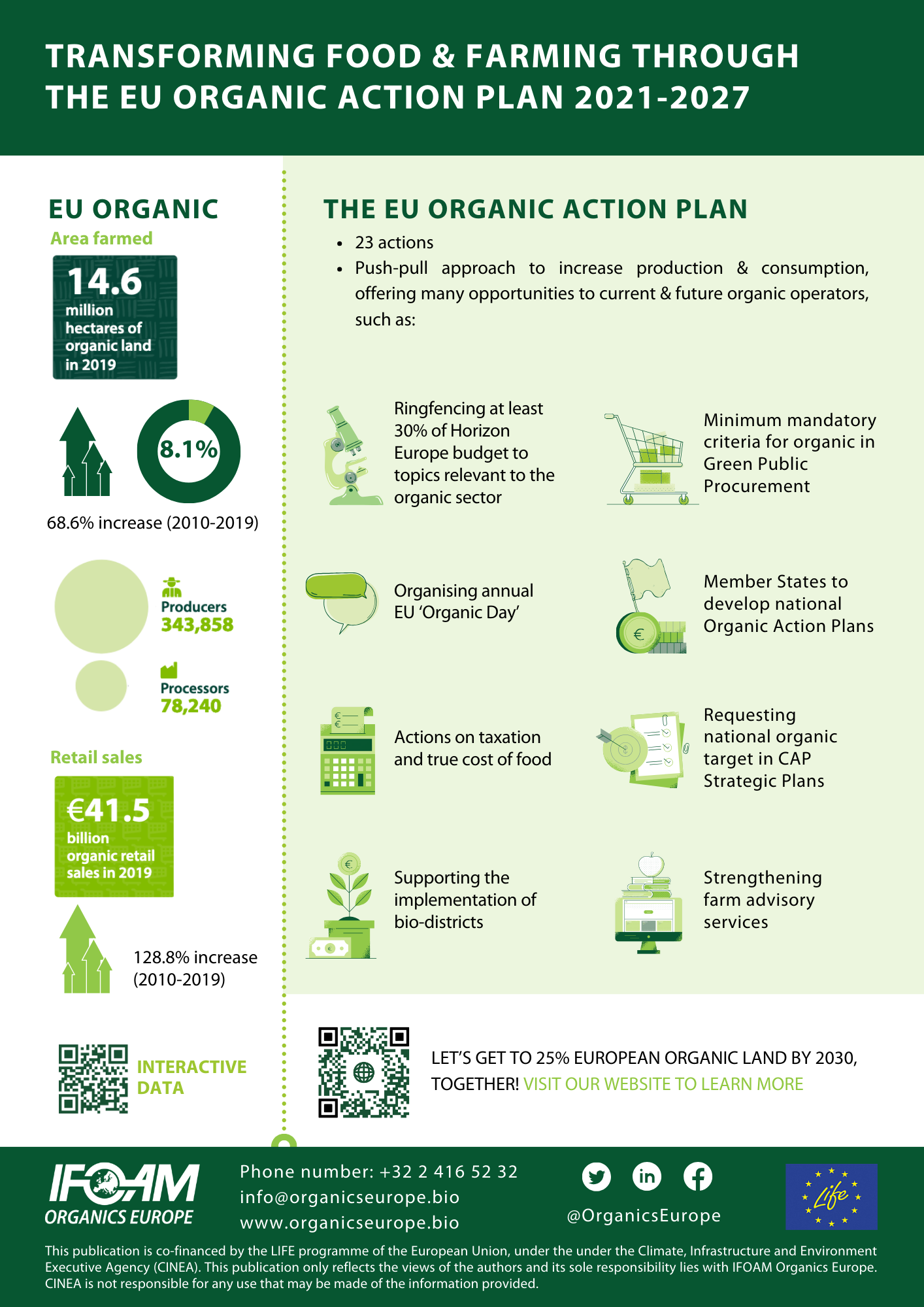
The Common Agricultural Policy (CAP) also plays a key role in reaching 25% organic land. Despite the disappointing deal on the CAP Strategic Plans Regulation, agreed upon within the last trilogue on 24-25 June 2021, Member States still face a huge responsibility to ensure that the next CAP will address the collapse of our biodiversity and the climate crisis. On 29 June 2021, at its General Assembly, IFOAM Organics Europe presented the new study ‘Prospects & developments for organic in national CAP Strategic Plans‘. The study visualises the efforts every country needs to put into place to reach their potential national targets, which should fairly contribute to the EU average 25% target. Visit our page on CAP & rural development, section CAP Strategic Plans & 25% organic land target, for more details.
Food policies like Sustainable Public Procurement (SPP) and promotional policies also play a big role in reaching 25% organic land. You can read more about SPP in the next section. IFOAM Organics Europe’s members can read all about applying for promotional policies to promote organic and sustainable products on our member extranet.
More and more institutional bodies want to reduce the environmental impact public sector consumption causes. To do so, Member States, regions, or cities are looking at Sustainable Public Procurement (SPP) to stimulate innovation in environmental technologies, products and services. Some examples of implementation are particularly successful, showing that sustainable public procurement is a low-hanging fruit, delivering across Europe and can be cost-effective too.
Among the positive examples are the city of Copenhagen. They reached almost 90% organic public procurement in its public canteens, all by reducing food waste and with no effect on expenditure. The French city of Mouans-Sartoux, co-leading the BioCanteens project is another one of those examples. For the past 20 years, Mouans-Sartoux has managed to distribute fully organic and local food daily. The drastic reduction of food waste compensated the higher cost of switching to organic products.
Institutions sourcing organically can be a lever for change
Sourcing organically is one way institutions can advance their sustainability and promote the development of environmentally friendly and sustainable agriculture and food practices. Organic public procurement is a strategic lever to sustainable and systemic change. IFOAM Organics Europe advocates for organic’s recognition as sustainable alternative in public procurement. We are doing so by transmitting best practices and initiatives, and shedding light on the benefits of organic, plant-based and healthier meals in sustainable public procurement – fewer CO2-emissions that can go up to 50% less food waste on plate, less pesticide exposure for children, and less costs on public health.
IFOAM Organics Europe is also a member of the Food Policy Coalition (FPC), co-leads the FPC’s public procurement task force and is very much involved in the activities of the sustainable food systems task force. We coordinated and contributed to the Paper “Sustainable Public Procurement of Food: A Goal Within Reach”, making the case that school public procurement is a low-hanging fruit in terms of policy options, and should be driving systemic changes. The paper also demonstrates sustainable public procurement of food are successful across Europe, can be cost-effective and should be further taken up at the local and regional level. We also contributed to the elaboration of the FPC’s policy recommendations on food public procurement.
Furthermore, IFOAM Organics Europe is a core member of the Buy Better Food Campaign (BBF Campaign), a Europe-wide coalition of more than 100 members (local and regional governments and NGOs), calling for public procurement rules that work for the environment, consumers, and workers, and that provide healthy food to all European citizens in public places such as schools, hospitals and elderly care homes.
Sustainable Public Procurement in EU policies
In October 2019, the European Commission published new voluntary EU Green Public Procurement (GPP) criteria for food, catering services and vending machines. Some of the key objectives of this EU GPP criteria-set are:
- Increasing the share of organic products;
- Avoiding the consumption of fish and marine products from depleted stocks;
- Promoting an increased offer in plant-based menus;
- Avoiding food waste and improving the overall management of waste;
- Avoiding the use of single-use items;
- Reducing energy consumption in kitchens and vending machines; and
- Reducing water consumption in kitchens.
In May 2020, the Farm to Fork Strategy was published as one of the components of the European Green Deal. It put forward the necessity to transition towards sustainable food systems, with the objective to make it “fair, healthy and environmentally-friendly” and to target primary production, the supply value chain and consumption. In the Farm to Fork Strategy, the Commission committed to the implementation of mandatory criteria for sustainable food procurement, including minimum mandatory criteria for organic products. The European Commission explicitly recognised the role of organic in this respect when publishing the Organic Action Plan in March 2021. The Organic Action Plan cites public procurement as a key tool and recognised the need for a greater uptake of organic products in public canteens.
The main actions foreseen by action 3 of the Organic Action Plan included:
- Integrating organic products into the minimum mandatory criteria for sustainable food public procurement, to be developed by 2023 as part of the legislative framework for sustainable food systems;
- Analysing the current situation as regards the application of 2019 EU GPP criteria, based on national action plans on organic farming, coupled to a call on Member States for an increase in the use of GPP by public authorities;
- Preparing specific events for public administrations in charge of public catering.
IFOAM Organics Europe sees SPP as a key and necessary aspect of the incoming legislative framework on sustainable food systems expected in 2023. In our reply to the inception impact assessment regarding this legislative framework, we advocate for the inclusion of an ambitious target for organic products in public procurement in the proposal expected for 2023 (at least 20% of products in public procurement tenders should be organic).
Moreover, IFOAM coordinated and contributed to the Manifesto for establishing minimum standards for public canteens across the EU, a document produced within the FPC’s Task Force on Public Procurement, where we advocate for the inclusion of seven mandatory minimum criteria for public canteens, namely:
- healthy food;
- at least 20% of organic food;
- small-scale farmers support;
- climate action;
- social economy and labour rights;
- fair trade, and
- animal welfare standards.
The Manifesto is endorsed by several expert organisations, and local and regional governments from around Europe. The Manifesto is also available in Spanish, French, German and Italian.
Besides the links to the Farm to Fork Strategy, it is also important to identify and end barriers in EU competition law so SPP could also contribute to developing community-supported agriculture (CSA), short supply chains, and increased use of fair trade products.
The labelling of food, including of organic food, informs consumers about the vision behind the production of a given food product. Special attention needs to be paid to ensuring consumers are not misled.
Organic provides a holistic approach to the environment, society, animal welfare and sustainability and covers wide range of qualities.
IFOAM Organics Europe monitors the development of different food labelling legislative initiatives in the EU with aim to:
- Harmonising development of different initiatives on origin labelling and quality logos for as wide a range of products as possible;
- Securing that the organic logo is the only eco-label for food and organic production, representing the highest standards for animal welfare; and
- Ensuring that nutritional value labelling does not mislead consumers with regard to the true nutritive quality of products.
Sustainability labelling
Read IFOAM Organics Europe position paper on sustainability labelling. Below you can read its highlights:
Political developments
The Farm to Fork strategy published in May 2020 mentions that the European Commission will “make a legislative proposal for a framework for a sustainable food system before the end of 2023”. The aim of this framework is “to accelerate and facilitate the transition and ensure that all foods placed on the EU market become increasingly sustainable”. As part of this framework, the Commission intends to “create a sustainable labelling framework that covers, in synergy with other relevant initiatives, the nutritional, climate, environmental and social aspects of food products”. This sustainability label, or at least the principles thereof, is also expected in 2023, and is led by the Commission’s Directorate-General for Health and Food Safety (DG SANTE).
The Commission also proposed a Directive on substantiating green claims based on the product environmental footprint (PEF) on 22 March 2023¸ led by Directorate-General for Environment (DG ENV).
While substantiating green claims and sustainability labelling do not aim to address the same problems (greenwashing and providing sustainability information respectively), these two Commission proposals could be heavily intertwined. Indeed, substantiating green claims was originally based on the Product Environmental Footprint (PEF) methodology, which could have legitimised the use of this method also for a sustainability label. IFOAM’s advocacy work has greatly contributed to the postponement of the Directive and the adjustment stemming from it, i.e a far less prominent place of the PEF methodology in the Directive. However, although the PEF is not as present in the proposal as it used to be, it is still a tool that the Commission aims to develop on the European market. As think tank IDDRI shows, the calculation method behind a sustainability label is a political decision of whether to support or not a transition towards more sustainable food systems. Methods strictly based on a life-cycle analysis, such as the PEF, support sustainable intensification, not a transition of the current food system towards agroecological practices.
The Product Environmental Footprint (PEF)
The Product Environmental Footprint (PEF) is a methodology that aims to evaluate the environmental impact of a certain product, food, and non-food. This tool is based on a life cycle analysis (LCA) and the European Commission’s Directorate-General for Environment has been developing it for about 10 years.
While this method works for manufactured goods, it is not capable, as per its conception, to account for the environmental impact within the complexity of agri-food systems. The main concern is that the PEF does not adequately account for the environmental impact of food products when it comes to externalities such as the impact of pesticides, the impact on biodiversity or animal welfare.
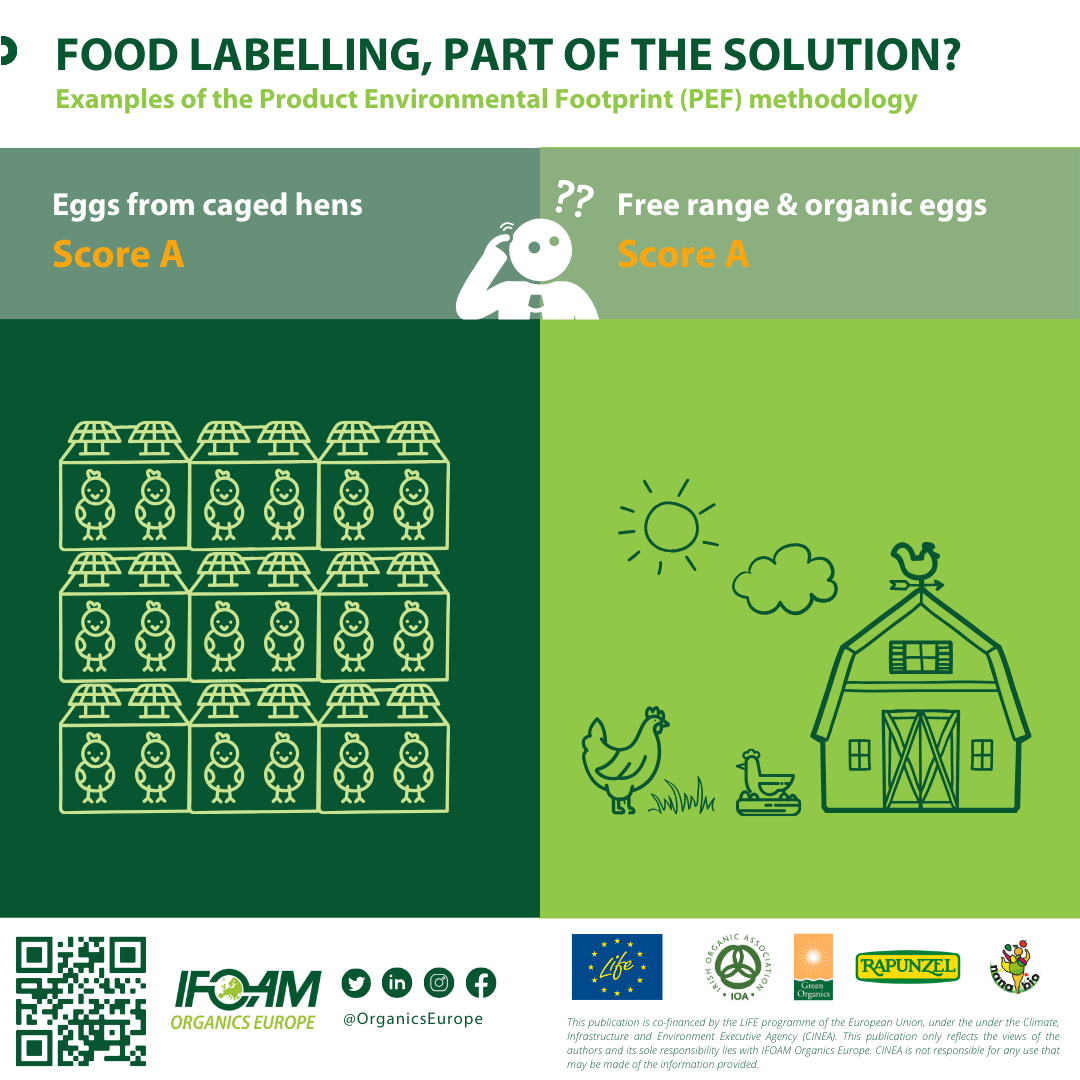
The PEF can differentiate the environmental impact between food categories, but not within food categories. This is because the PEF does not differentiate well between the impact of different methods of production. For instance, free range or organic eggs with the least environmental impact and high level of animal welfare will score the same than eggs from caged hens.
Generally, given that the PEF does not consider externalities well, it tends to reward more intensive methods of production. IFOAM Organics Europe has summarized this and other concerns about the PEF in its position paper and in its technical briefing that highlights the limitations of its methodology.
The PEF methodology applied to food products has been criticised by civil society, farmers and an increasing number of retailers and processors. Moreover, on 26 October 2022, IFOAM Organics Europe participated in a webinar “Green Claims & PEF: how can metrics foster or destroy sustainability?”. During this event, various actors from economic, political and research background explored the implications of the methodological choices around the environmental labelling of food and textiles products. You can find the recordings here.
The Planet-Score
There are few existing initiatives that go beyond life cycle analysis (LCA) and also support the agroecological transition, in line with the Farm to Fork strategy objectives. An example of one of these initiatives is the PlanetScore that was developed in France and is currently being tested in several Member States. While the PlanetScore is still broadly a work in progress, it more accurately evaluates the true environmental impact of food products compared to other existing methodologies, as it better considers externalities such as biodiversity, use of pesticides, animal welfare.

The Planet-Score is mobilizing elements of the Life Cycle Assessment (LCA), with two fundamental modifications that are going beyond LCA methodologies:
- An updated method when it comes to certain indicators
- A series of additional key performance indicators to reflect those externalities that are not sufficiently taken into account in the LCA methodology (pesticides, climate, biodiversity and animal welfare) through a bonus / malus system which considers elements such as deforestation, agricultural practices, GMOs, pesticides, antibiotics, origin, and carbon sequestration.
Nutrition labelling
As per Regulation 1169/2011 first, and the Farm to Fork strategy more recently, the Commission will propose a harmonized mandatory front-of-pack (FOP) nutrition labelling by mid 2023. This initiative aims at empowering consumers to make informed, healthy, and sustainable food choices.
IFOAM Organics Europe supports the initiative of the Commission to tackle the issue of non-communicable diseases and believes that a front-of-pack (FOP) nutritional label must be part of a wider systemic change in the food environment, aligned with the ambitions of the Farm to Fork Strategy.
Read our position paper on nutrition labelling.
To transition to a more sustainable food system, push and pull measures and policy support to boost both organic production and demand are needed. A summary on the new Organic Action Plan’s main actions as well as IFOAM Organics Europe’s priorities and suggestions for transforming food and farming are in the above section ‘Reaching 25% organic land in Europe by 2030: Organic Action Plan and other initiatives’ which mainly focuses on the new EU Organic Action Plan.
Read IFOAM Organics Europe’s position on sustainability labelling, and IFOAM Organics Europe’s position on nutrition labelling.
Targets for organic land and consumption, combined with a new EU Organic Action Plan and adequate CAP support, will ensure a balanced growth of both organic production and demand, and develop the entire organic supply chain through a push-pull approach. In short, the EU organic movement’s priorities are:
- Linking the Farm to Fork Strategy’s objectives and other policies such as the Common Agricultural Policy (CAP). We believe that 70% of the CAP budget across its two pillars should be earmarked for environment and climate action, to allow full use of agri-environmental measures under rural development (pillar 2) and of innovative mechanisms like eco-schemes (in pillar 1);
- Setting a mandatory and progressive EU target of 20% of organic products in public kitchens by 2022, which would increase to 60% by 2030, because a push-pull approach is needed. Denmark’s example proves that policy plays key role to create a market for increased organic production, through Green Public Procurement (GPP) and promotion policies. This is an effective way to develop the organic production chain (retailers, traders, processors…) and give local authorities a prominent role in the Farm to Fork Strategy;
- Establishing systemic, transdisciplinary research & innovation as well as effective advisory services to leverage organic and agroecology’s potential to transform our food and farming systems;
- Researching organic approaches to plant health and animal production;
- Setting-up well-funded farm advisory services independent from economic interests, like companies selling inputs, and aimed at helping farmers to transition to agroecological production systems – which are knowledge intensive rather than input intensive;
- Including taxation measures in the Farm to Fork Strategy to help Member States make organic products more affordable and shift away from pesticides. The national context should indicate which measures would be most effective;
- Informing, consumers about food production’s negative and positive externalities, the EU organic logo and the benefits of organic production for the environment and animal welfare.
The EU Food Policy Coalition
IFOAM Organics Europe is part of the EU Food Policy Coalition. This coalition was created informally in 2019 and works towards policy integration and alignment at the EU-level to facilitate the transition to sustainable food systems. It brings together civil society and organizations working towards refining and advocating for a shared vision of sustainable food systems at the EU level. Partners include NGOs from a broad spectrum working on food systems, grassroots social movements, farmers organizations, organizations of fishers, trade unions, think tanks, scientific and research groups.
We support shifts to more sustainable diet with more plant-based products, less intensive animal production, and innovative governance models for the Farm to Fork Strategy. We believe food policy at all levels should give a prominent role to civil society and local authorities.
FoodSfhift2030
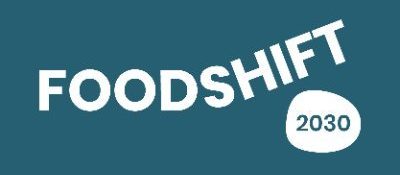
FoodShift2030 will launch an ambitious, citizen-driven transition of Europe’s food system to a low carbon, circular future;
SchoolFood4Change
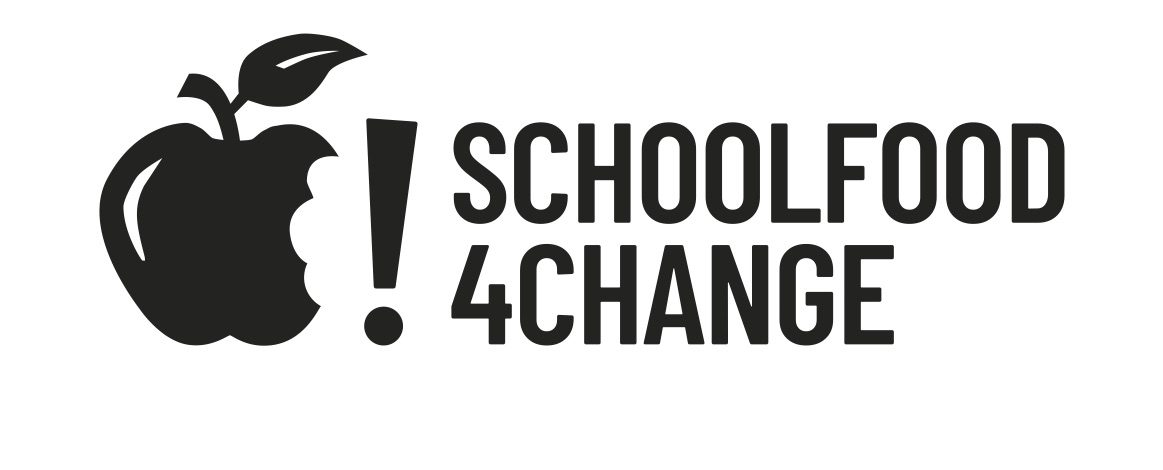
SchoolFood4Change will provide innovative solutions and tailored, locally adaptable good practices for schools, school meal providers, public authorities, and policymakers, in line with the EU’s Farm to Fork Strategy;
OrganicTargets4EU
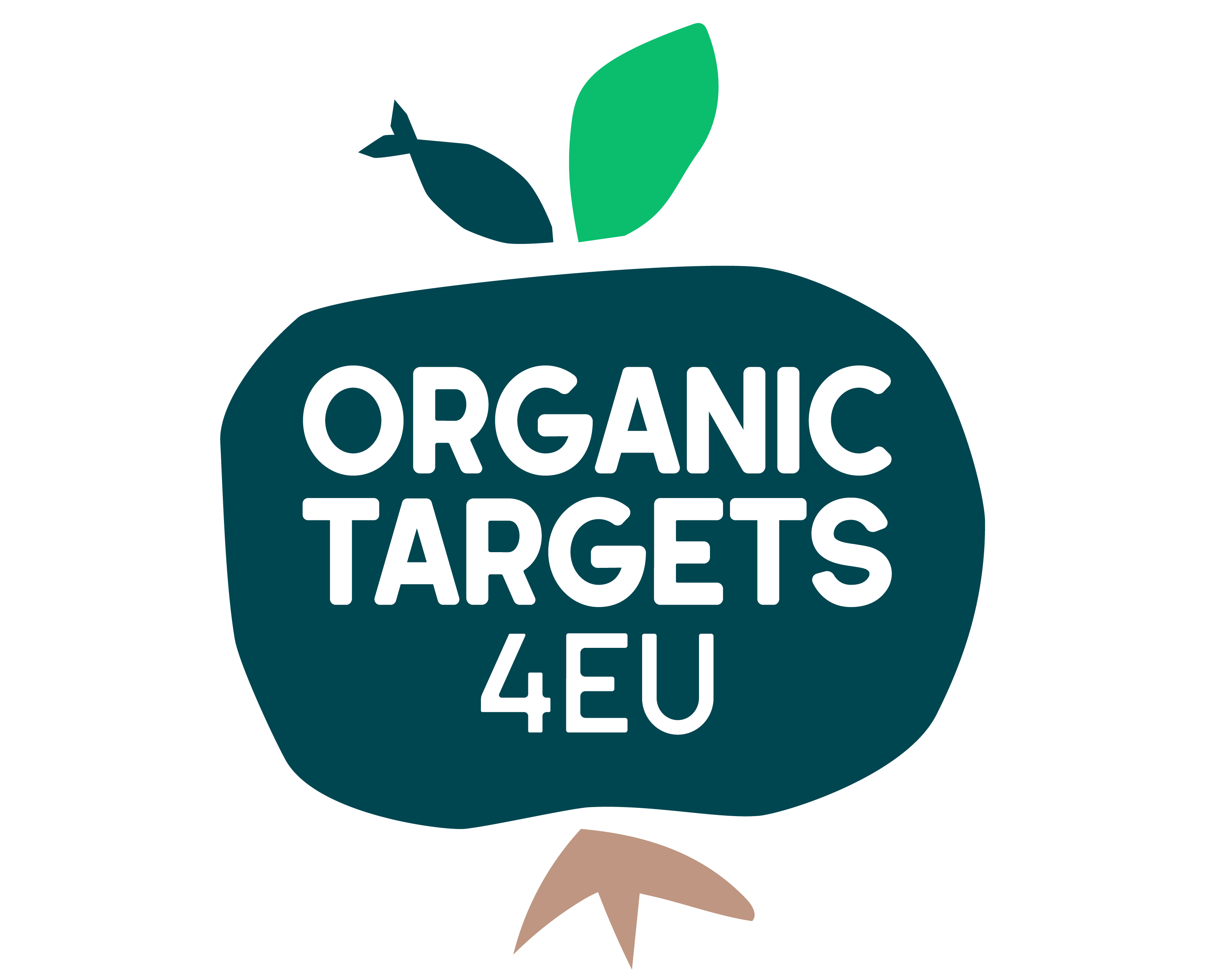
OrganicTargets4EU supports the Farm to Fork strategy in achieving the targets of 25% organic agricultural land and a significant increase of organic aquaculture by 2030. The project assesses the drivers and lock-ins affecting the development of the organic sector to propose consistent scenarios to achieving the targets;
Buy Better Food – Sustainable food on the public plate

IFOAM Organics Europe co-leads the Buy Better Food – Sustainable food on the public plate campaign, which aims to raise awareness on sustainable public procurement of food in Europe. This campaign’s main objective is including mandatory criteria for public food procurement in the Sustainable food systems framework initiative, that will be published in 2023.
To achieve its goal, this advocacy campaign will amplify good practices and challenges in public food procurement, demonstrating how it can contribute to sustainable, healthy and fair food systems the EU Farm to Fork Strategy and UN Sustainable Development Goals put forward.
Find out more about the campaign on the official website.
The city of Copenhagen is using green procurement to foster sustainable diets. A combination of forward-looking green procurement policy and a determination to transform food culture are the recipe for success when it comes to increasing organic in public institutions. As of 2017, the share of organic ingredients in meals in public canteens in Copenhagen has reached 89%, and this transition has reshaped the public food system as well as the meals that are served to the citizens of Copenhagen. Read more about this initiative on euorganic2030.bio.
‘Steps to Organic’ is a Finnish voluntary programme for all private and public kitchens. Its purpose is to help increase the use of organic products as part of sustainable development. Consumers can also find restaurants that offer organic food on the programme’s website. For more information, visit euorganic2030.bio.

The Irish Organic Association supports IFOAM Organics Europe’s project “Safeguarding Organic from Greenwashing Labelling”. The project goal is to protect the organic sector against the wrong use of ECO and BIO derivatives by non-organic industry. Secondly, it aims to prevent using the Product Environmental Footprint (PEF) approach in the forthcoming sustainability labelling framework of the EU.
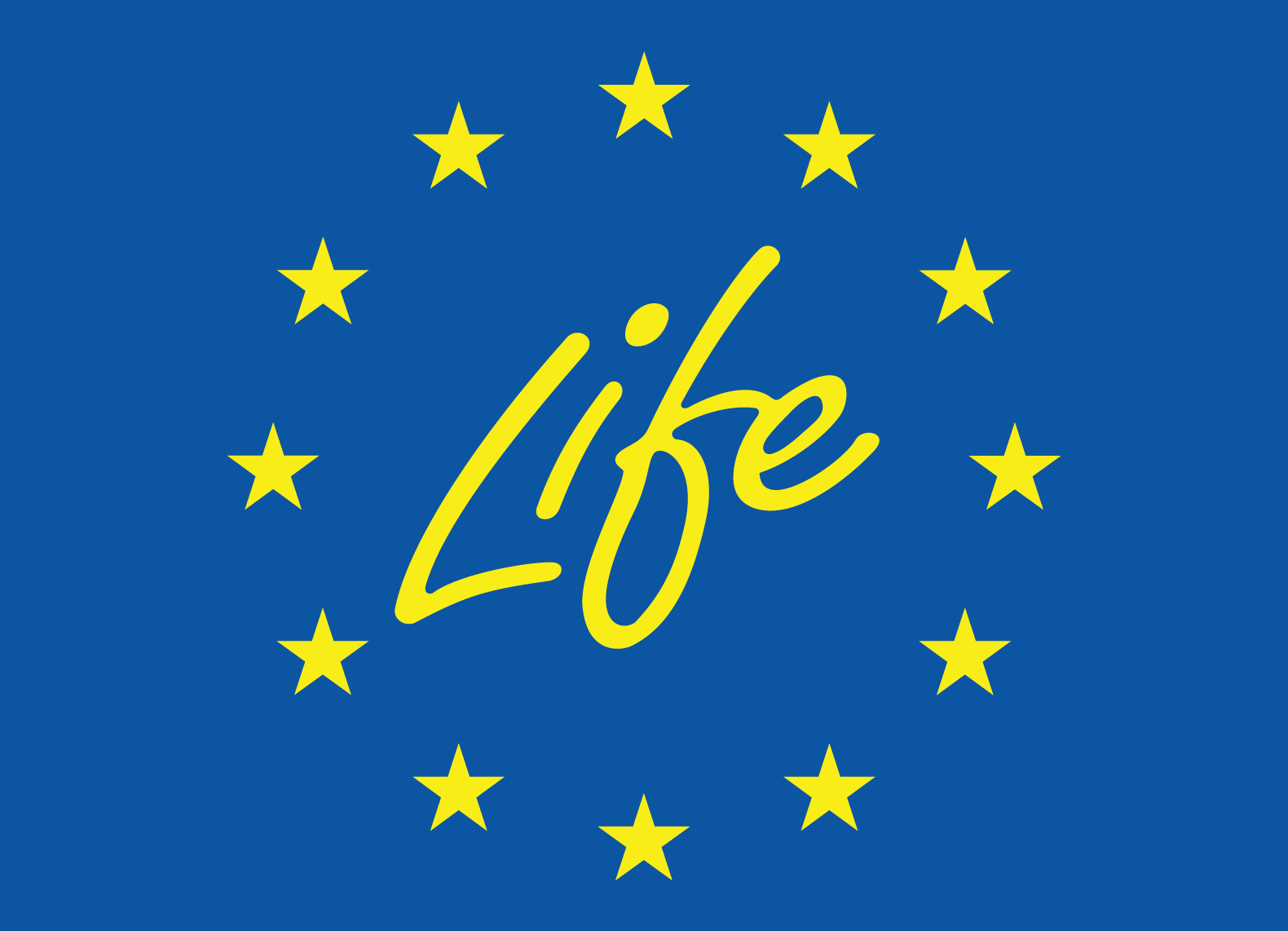
The work of IFOAM Organics Europe on this topic is co-financed by the LIFE programme of the European Union, under the Climate, Infrastructure and Environment Executive Agency (CINEA). This page only reflects the views of the authors and its sole responsibility lies with IFOAM Organics Europe. The CINEA is not responsible for any use that may be made of the information provided.

